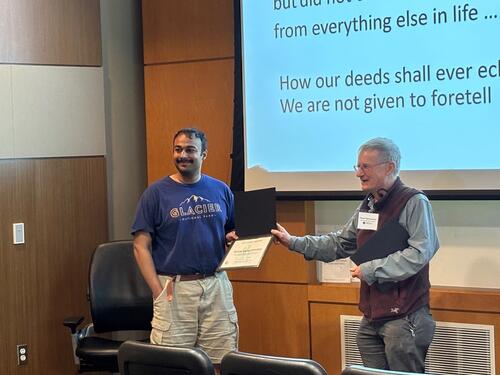
Shasta Ramachandran, graduate student with Yoram Alhassid, Frederick Phineas Rose Professor of Physics, received “Best Young Presenter” at NMP’25.
Shasta Ramachandran is a fifth year graduate student working on cold atomic physics, specifically the BCS-BEC crossover. He is especially passionate about topics in numerical methods for strongly interacting systems. In his spare time, Shasta enjoys hiking, music, and petting dogs.
Ramachandran commented, “This award is a testament to the foundational work Professor Alhassid has done on topics from nuclei to quantum dots to ultracold atoms. It was an honor to represent our group and this university at this conference by presenting our work on the Fermi polaron problem.”
Alhassid commented, “The system that Shasta discussed in his award-winning talk – the Fermi polaron – is a paradigmatic system in quantum many-body physics that was first considered by Landau and Pekar in 1948. It describes a mobile impurity that interacts with a spin-polarized Fermi sea, and it was recently realized experimentally in ultra-cold atomic Fermi gases. This system exhibits a rich variety of quasi-particle excitations, including the attractive polaron, the molecular dimer, and the repulsive polaron.
Theoretical explorations of the Fermi polaron in its strong coupling regime have relied mostly on uncontrolled approximations. Shasta carried out the first controlled thermodynamic calculations of the Fermi polaron using state-of-the-art quantum Monte Carlo methods, developed previously in my group. In the literature, most finite-temperature quantum Monte Carlo calculations are carried out in the grand-canonical ensemble, in which particle number fluctuates. However, the canonical ensemble with fixed particle numbers is the more suitable ensemble for describing the polaron problem, and our group is among very few who have expertise in canonical-ensemble Monte Carlo methods.
Furthermore, because it is a spin-imbalanced system, the Fermi polaron was expected to have a Monte Carlo sign problem that leads to large uncontrolled error bars in the calculation of observables. This has likely discouraged exploration of the Monte Carlo method for this system. However, Shasta found that for the polaron the sign problem is moderate over a wide range of temperatures and coupling strengths that are relevant to experiments, which allowed him to carry out accurate quantum Monte Carlo calculations in this range.
This work was done in collaboration with Scott Jensen, a former graduate student in the group, when he was a postdoc at the University of Illinois Urbana-Champaign. Scott is now on the faculty of the University of Louisville.”
From the conference site, “NMP’25 is the seventh meeting in the series, which began in 2004, with subsequent conferences in 2007, 2011, 2014, 2017, and 2022. The main goal of this series is to bring together scientists studying a broad range of objects of mesoscopic nature that display common features and can be explored using similar approaches. Currently, research on strongly correlated many-body systems and topological states of matter is blossoming, due to a number of experimental breakthroughs, theoretical developments, and enormous computational progress. Closely related is also quantum computing, an area of fast-increasing interest and importance. Consequently, one can take advantage of these connections and of the progress made in different physical contexts. NMP25 will provide a unique and exciting platform for experts in a broad range of areas to interact and exchange ideas on a diverse set of topics. We hope that the resulting interactions will lead to inspiring cross-disciplinary collaborations.
Mesoscopic physics has greatly benefitted from the approaches developed in the context of nuclear physics. Therefore, it is natural that a broad-scope conference on mesoscopic physics is held at FRIB, the largest university-based DOE laboratory with unique capabilities for engineering and studying exotic nuclear species. FRIB and the Department of Physics and Astronomy at MSU both support the seventh conference. We are also applying for a special grant from the National Science Foundation to support the participation of young researchers.”